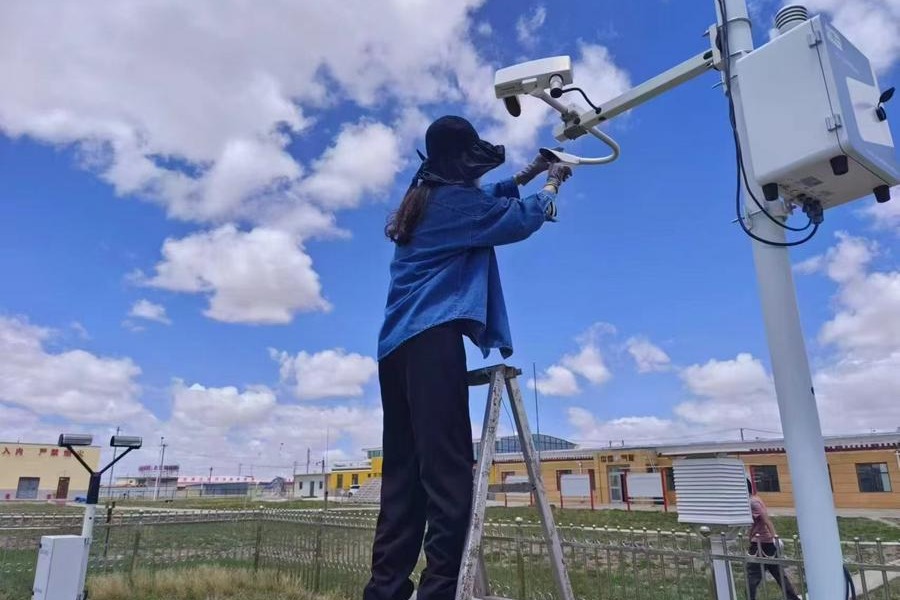Academy report urges more focus on consumption side of carbon emissions

The Chinese Academy of Sciences unveiled its 2024 Report on Consumption-based Carbon Emissions on Wednesday, highlighting the need for a more scientific and rational global carbon accounting system that considers both production and consumption emissions.
The report sheds light on the significant impact of consumption-based carbon emissions in a globalized economy, where emissions are no longer limited to production processes. It emphasizes that understanding and addressing consumption-based emissions is crucial.
Analyzing data from 1990 to 2019, the report reveals a critical trend: developed countries tend to have higher consumption-based carbon emissions than production-based emissions, while developing countries exhibit the opposite pattern. This underscores the importance of accounting for emissions from a consumption perspective.
Focusing on the carbon emissions triggered by consumption behaviors, the report calls for a coordinated approach to accounting for both production and consumption emissions. It advocates a more scientific and equitable distribution of global carbon reduction responsibilities, stressing the need to refine methodologies, improve data quality, and enhance international cooperation.
"International trade has had a great impact on carbon emissions of developing countries," said Wei Wei, one of the leading researchers who prepared the report and vice-president of the academy's Shanghai Advanced Research Institute. "The export of carbon-intensive products to developed countries boosted their economic growth and employment, but it also led to production-based carbon emissions generally higher than those on the consumption side.
"Consumption-based carbon accounting focuses on emissions driven by consumption behaviors, providing a comprehensive calculation of greenhouse gas emissions across different regions or industries. This approach helps clarify the carbon footprint of economic activities and better delineate the responsibilities of producers and consumers, promoting fairness and justice."
The report highlights that from 1990 to 2019, consumption-based carbon emissions in major developed countries consistently exceeded their production-based emissions. In contrast, major developing countries saw their production-based emissions outpace those from consumption. Non-OECD countries, primarily developing nations, experienced a growing gap between production and consumption-based emissions, widening from 1.47 billion metric tons in 1990 to 4.17 billion tons in 2019.
In China, consumption-based carbon emissions have consistently been lower than production-based emissions, with the gap increasing from 700 million tons in 1990 to 1.8 billion tons in 2019.
China's export trade reduced its embodied carbon intensity by 83.3 percent between 1990 and 2019, providing more green and low-carbon products globally. In 2021, China shouldered 100 million tons of carbon dioxide emissions through the steel raw materials trade and 250 million tons through photovoltaic product exports.
Amid the pressing challenge of global climate change, the report calls for a scientific and rational distribution of carbon reduction responsibilities. It recommends strengthening research on consumption-based carbon accounting methodologies, expanding product coverage, and developing a comprehensive "top-down" and "bottom-up" carbon accounting system.
"We must coordinate production and consumption-based accounting to scientifically allocate global carbon reduction responsibilities," Wei said.
Zhang Xiliang, director of the Institute of Energy, Environment, and Economy at Tsinghua University, also called for the adoption of consumption-based methods to clarify the roles of producers and consumers in carbon emissions.
"The governance of global environmental and climate change in a united response should consider equity in addition to efficiency," Zhang said.
?
- Xi urges youth to contribute to Chinese modernization
- Pingyao Ancient City bustles with a surge of visitors
- Lijiang aims to become the 'capital of plateau outdoor sports'
- Saving the golden orchid
- Helicopter crash kills one, injures four in Suzhou
- Communist Youth League of China has about 75.32m members





































